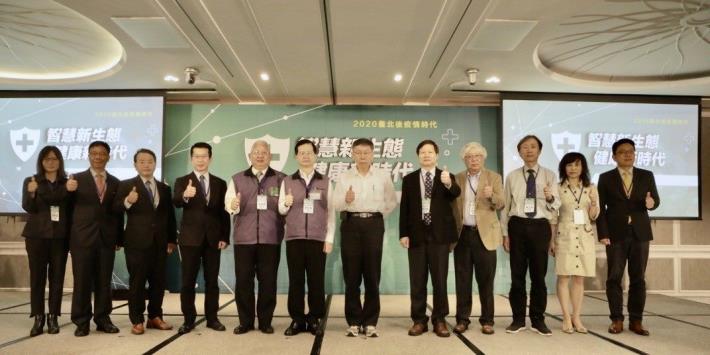Taipei City’s post-pandemic Intelligent New Ecology, Healthy New Era forum held:Molding a new look for intelligent health to face post-pandemic changes
Under the impact of the COVID-19 epidemic, the global economy has suffered and medical systems in many countries have also faced a stiff challenge. In light of this, Taipei City Department of Health held the Intelligent New Ecology, Healthy New Era forum at the Mandarin Oriental Taipei at November 23, 2020. Experts from industry, government and research circles and private operators were invited to discuss the vaccine industry in the post-pandemic era, rapid testing tools, medical diagnosis and treatment by telecommunications, and other issues of public concern. The event was livestreamed online, attracting viewers and focusing more attention on the issues. Taipei City Mayor Wen-Je Ko said that it is almost a year since the outbreak of COVID-19 but alarms bells are still sounding across the globe. Taiwan learned from the painful lessons of SARS 17 years ago and great progress has been made in terms of epidemic period infection control and communications system; adding to this are strict border controls, high quality of the people and good cooperation from them. Taipei City also implemented various new measures, such as anti-epidemic hotels, anti-epidemic taxis, quarantine stations, facemask vending machine etc. While the epidemic was successfully controlled in Taipei, however, it cannot be ignored that “existing with the epidemic” will become the new way of life in the future and the public must be prepared. In his presentation, commissioner of Taipei City Department of Health Shier-Chieg Huang said that the epidemic has had a big effect on everyone’s lives and people can’t travel overseas, giving rise to “contactless” economy and medicine. In terms of diagnosis and treatment by telecommunications, the approach differs between countries; in Taiwan, there are legal restrictions. No matter what the future trend is, it is worthy of continued attention. In the first session, “Development of the vaccine industry”, Feng-Yee Chang, president of the Infection Control Society of Taiwan, gave a keynote speech; he then discussed issues relating to vaccine R&D with Chung-Cheng Liu, general manager of Addimune Corporation, and the progress of the purchase of vaccines from overseas that is of public concern. Chang said that public-private cooperation is very important for the development of the vaccine industry; the public sector has public responsibility to lead the way, the private sector has to be efficient and pursue profit; the two sides should establish a partnership. On the progress of development of a local vaccine, Liu stated that Taiwan is quite short of experience in vaccine development, therefore, it has to be cautious with regard regulations and hospital clinical testing. It is hoped that a local vaccine will smoothly enter stage two of clinical trials at the end of this year. In session two, Chung-Hsiun Wu, CEO of the Development Center for Biotechnology, gave a keynote speech on Rapid testing/Application of Testing Tools. In the discussion with Chih-Jung Chang, COO of EirGenix Incorporated, that followed, the two expressed the belief that public-private partnership is the ideal method for promoting testing tools in the post-epidemic era; taking Taiwan as an example, Academia Sinica provided antibodies and Tzu Chi University developed an antibody rapid test kit that received approval for sale in Indonesia in just three days and sold 500,000 doses. A similar situation has been seen in South Korea; after the COVID outbreak, the government activated Emergency Use Authorization (EUA), providing antibodies to operators, who completed the development of a testing kit product in under two week; the product was quickly approved for sale and also exported, resulting in a large increase in export revenue. This shows that that public and private cooperation will be the future trend. For session three, Development of Medical Diagnosis and Treatment by Telecommunication, Sheng-Jean Huang, superintendent of Taipei City Hospital, gave a keynote speech. He said that March-November 2020, 260 people in home isolation and quarantine were diagnosed and treated by telecommunications in Taipei City, reducing the need to visit hospital, however, accumulation of more experience is needed and support is needed in terms of regulations, medical technology and public trust etc. Ministry of Health and Welfare administrative deputy minister Chung-Liang Shih pointed out that in the past both doctors and patents were doubtful about medical treatment and diagnosis by telecommunications, however, there was a high level of acceptance during the epidemic period; the acceptance level of doctors, however, did not rise much which means there are still obstacles to be overcome in future. Ming-Chih Chiang, deputy general manager of the Intelligent Services Division of Advantech, expressed the view that medical diagnosis and treatment by telecommunications needs professional facilities and equipment, however, domestic hospitals currently lack video system platform physical face to face meeting, which is a direction in which ICT operators can work in future. At the end of the forum, Mayor Ko expressed his opinions on the three themes of discussion. On the subject of national vaccine development that is of concern all round, he said that the fact that there has only been a few local cases presents difficulties in human subject research. However, it is not necessary to complete the whole process because, after the first clinical trial is complete, the results can be sold to an international pharmaceutical company. He said that the civil-government public-private partnership model will be an important cooperation method in future. Also, Taiwan’s digital transformation has not been fast enough due to successful epidemic prevention, however, crisis is opportunity; some arrivals from overseas are likely to have aches and pains and colds during their time in hotel quarantine or in home quarantine or isolation, therefore, using this opportunity to develop medical diagnosis and treatment by telecommunications can be considered, building a complete telemedicine model.


![Taiwan.gov.tw [ open a new window]](/images/egov.png)
